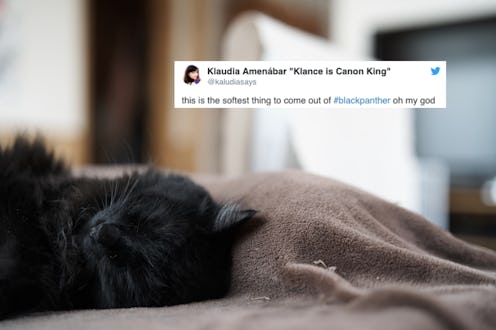Life
More Black Cats May Be Getting Adopted Thanks To “Black Panther” & Twitter Has All The Feels
Black Panther has already made history in many ways, but according to various anecdotes being shared on social media, it's also spawning a new trend: more black cats may be getting adopted thanks to Black Panther, and the phenomenon has given Twitter all the feels. Before you start celebrating that much-maligned black cats are finally getting their due, though, it's important to look at the full picture — and it may be that midnight-colored kitties are a bit more popular than they seem without T'Challa's help.
Pet shelters and their volunteers are reporting that fans of the movies are seeking a bit of their own Black Panther magic by adopting all-black cats, which are traditionally believed to be less adoptable because of negative connotations about bad luck and witchcraft (though that holds much less sway than it once did). It's hard to get hard and fast statistics on this kind of thing, but based on widely-shared anecdotes, the film definitely seems to have influenced the adoption decisions of movie-goers across the U.S. A screenshot from a Tumblr user that was shared to Twitter (where it quickly went viral) claimed that "my local pet shelters went from having something like 50-60 black cats between them to having NONE, because they’ve all been adopted out and named after the characters.” Which on the surface appears to be wonderful news — but it's possible that the kitties were getting adopted just fine on their own.
As it happens, the idea that black cats are less adoptable than other kinds isn't necessarily all true, at least in America. Black cats themselves have attracted a bad rap in European and Western folklore for several centuries, because they're tied in with superstitions. Black cats have been variously portrayed as witches' familiars, witches themselves in disguise, agents of demons and other dangerous and volatile creatures. The idea of shape-shifting witch-cats is probably Scottish in origin and made its way to America with the Puritans.
The bad luck that's supposed to come from a "black cat crossing your path" may be originally Germanic, because German folklore carries many similar beliefs — black cats who lay on graves, for instance, supposedly reveal that the person's soul is tormented. However, superstitions about black cats vary widely between regions and often focus on good luck rather than bad. In Japan, for instance, they're celebrated as bringers of good fortune. A collection of American folklore from the 1960s reveals that in different states across the US, everything from pulling or stroking a black cat's tail seven times to owning one as a pet or having one come in at the front door of your house was regarded as excellent luck. And in Ozark folk belief, strange black cats that showed up at your front door were always to be welcomed.
What does this actually mean? According to the ASPCA, black cats are adopted at higher rates than any other color of cat — but also make up the highest proportion of cat shelter populations. In other words, they're more likely to need adopting, but once they're in a shelter, people are more than keen to take one home.
Old prejudices do die hard. I own an adopted dark-colored tortoiseshell who remained at a shelter because a potential adopter thought she was "too dark", and pretty tabbies and white purebreds like designer Karl Lagerfeld's kitten Choupette do attract a lot of attention on social media. (Unfortunately, nobody's done a study on whether black cats are more popular than other kinds on Instagram.) However, the reputation of black cats may also help their adoptability. The idea that black cats are "bad luck" or otherwise different, in ways that a standard orange-colored kitten isn't, probably helps black cats out — people want their pets to be special.
If you're looking to bring your own T'Challa, Shuri, Killmonger, or Ramonda home with you, rest assured that black cats will be happy to find a forever home, no matter what box office records are being smashed.
